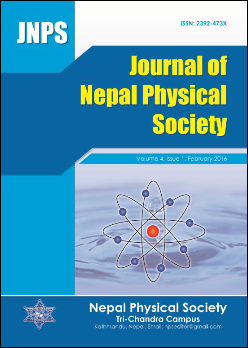Free Scattering Theory in Circularly Polarized Laser Field
DOI:
https://doi.org/10.3126/jnphyssoc.v4i1.17340Keywords:
Volkov Wave Function, Differential Scattering Creoss section, PolatizationAbstract
In the present study, we have investigated scattering of an electron by hydrogen atoms in the presence of the Circularly Polarized (CP) laser field. We have discussed the polarization effect of laser field on hydrogen atom and effect of the resulted polarized potential on differential scattering cross section is studied. We assumed the scattered electrons having kinetic energy 100 eV because it permitted to treat the scattering process in first order Born Approximation. The scattering electron was described by Volkov wave function. We found the differential scattering cross section decreases with the increase in scattering angle, for a fixed value of a laser parameters and kinetic energy of an incident electron. From this study we found that, the differential scattering cross section for the electric field perpendicular to the direction of momentum transfer depends on the elastic scattering amplitude. Finally, we concluded that the differential scattering cross section greatly depends upon the polarization of the laser field.
Journal of Nepal Physical Society
Volume 4, Issue 1, February 2017, Page: 78-87
Downloads
Downloads
Published
How to Cite
Issue
Section
License
All right reserved. No part of this Journal may be reproduced in any form or by any electronic or mechanical means, including information storage and retrieval system, without permission in writing from the publisher, except by a reviewer who may quote brief passage in a review. The views and interpretation in this journal are those of author(s) and they are not attributable to the NPS.




